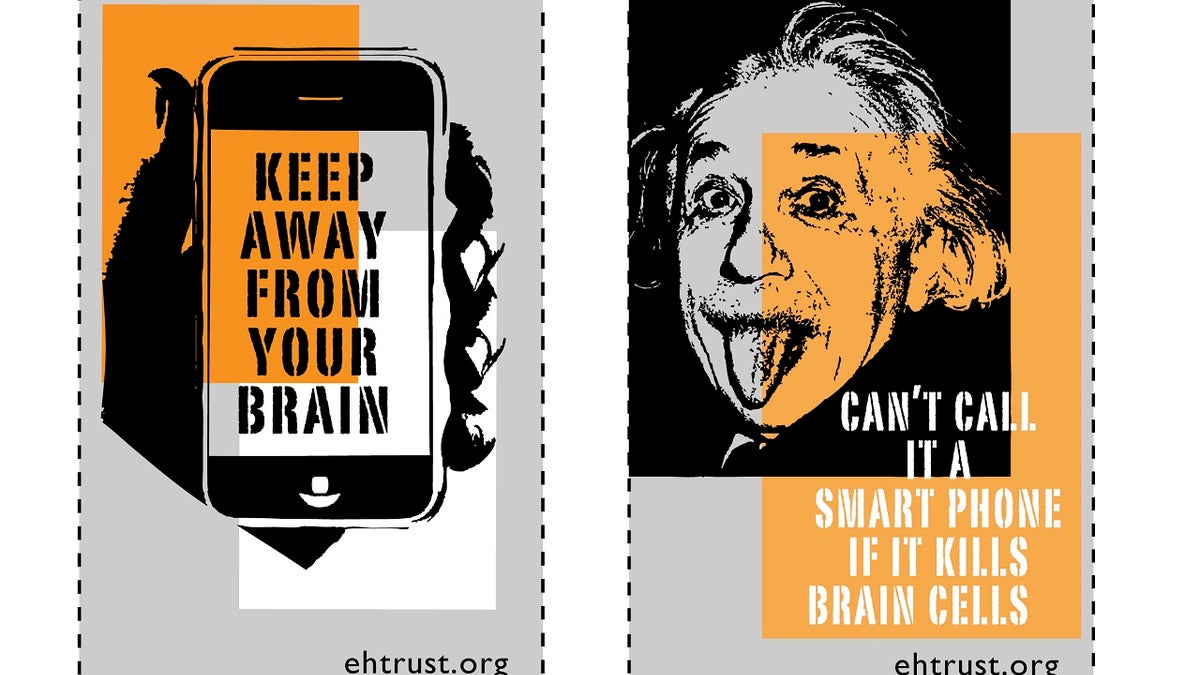
Cell phones should come with warning labels such as these ones, argues an environmental health group. (Environmental Health Trust)
Here we go again.
Decades of research have found exactly zero solid evidence of a connection between cell phones and cancer. And that's done exactly zero to stop the tin-foil hat talk from the conspiracy crowd. A new book by an environmental health advocacy group carries on the tradition, arguing not just that phones cause cancer but that they should come with warning labels -- just like those on packs of cigarettes.
"In terms of awareness of microwave radiation risks from cell phones, the U.S. is far behind other countries, including Switzerland, Israel, France and Germany," frets Dr. Devra Lee Davis, founder and president of the non-profit organization Environmental Health Trust. In her book "Disconnect," Davis urges the FCC to require all new cell phones to be labeled with stickers warning users of the hazardous radiation produced by talking on -- heck, even carrying -- a phone.
According to Davis, a cell phone is a two-way microwave radio that has the capacity to produce malignant tumors in the brain as well as damage other sensitive parts of the body. Other nations "require cell-phone makers to publicize radiation rates directly on phones sold to their citizens, provide special labeling for low-radiation phones, and restrict their use by children, who are more vulnerable to radiation," Davis said. "We are asking that the FCC oversee the creation of a new standard for cell phones" warning of exposure to the dangerous emissions.
Idle chatter isn't so harmless, she argues -- but don't go throwing your iPhone or Droid in the hazardous waste bin just yet.
There are currently no significant studies that have found a link between cell-phone use and the development of brain tumors. The National Cancer Institute has published an extensive list of studies conducted in regards to the issue, all of which have come up negative -- radiation-free goose eggs.
But that evidence isn't enough. Davis claims the studies are out of date, arguing that the accepted model scientists have been using is derived from a 1991 study that involved testing a 6'2" man with an 11-pound skull. And that's hardly an accurate measurement for the average cell-phone user, she says. Davis feels the FCC has dropped the ball in terms of research.
"The FCC does not employ a single health expert, unlike other governments where you have people who understand public health. The FCC has a very under-supported staff," Davis told FoxNews.com, noting that "if you look closely you'll see there are already many fine print warnings. There's a warning on the iPhone that says it can exceed the FCC exposure guidelines if you put it in your pocket. The Droid comes with a warning not to hold it on the abdomen of a teenager or pregnant woman," she said.
It remains unclear why you would hold a Droid phone on the abdomen of a teenager.
Regardless, the cell-phone companies FoxNews.com contacted, including Apple, Motorola, and Samsung, refused to comment on these allegations.
Along with a call to action for the government -- and festive stickers people can use to decorate their phones -- the Environmental Health Trust website lists studies from animal tests that apparently prove that cell phones pose a risk. But can you believe THOSE tests? As you might expect, there's debate as to whether they hold any merit.
Dr. Lynne Taylor, the director for Neuro-Oncology for Virginia Mason Medical Center, notes that most of the studies Davis lists have yet to be published in a scientific journal. She also argues there are going to problems with most studies of cell phone safety, given the ever-evolving nature of mobile-phone design.
"The literature's obviously flawed, because you're taking cell-phone technology that's literally changing in front of you," Taylor told FoxNews.com. "I haven't found any scientific articles that prove that non-ionizing radiation causes cancer. All of the studies we have to rely on involving patients are completely flawed -- asking humans to recall their cell-phone use, the hours they use it, the ear they use the most. So there's no proof that there's a connection in any way."
Davis recognizes that most human studies come up negative -- and the answer is longer, more in-depth studies, she says.
"If you look at those studies that have followed people for ten years or more, you find deeply troubling results," Davis told FoxNews.com. "In almost all of those studies, they have found a doubled risk of brain tumors ten years after heavy use. Most studies are too short, only under five years."
Ask and you may receive! Davis may just have gotten her wish.
A study by the name of COSMOS -- short for the Cohort Study on Mobile Communications -- has been underway in Europe since last year, tracking over a quarter of a million subjects. It'll be sure to give us a concrete, definitive answer to the cell phone-cancer issue.
The only problem? the results of the massive, longitudinal study won't be known for the next thirty years. Should you stay off your iPhone until then? Even Taylor says it would be unwise for people to jump to any conclusions on the matter, given the delicate nature of what "Disconnect" asserts.
"It's incredibly difficult to be a patient dealing with a diagnosis of a brain tumor," Dr. Taylor told FoxNews.com. "They take what the media says very seriously. They're always bringing me articles of a cure that's been reported or a possible reason why they got their tumor."
"And to tell them that they have caused their brain tumor by their own cell phone use is a very unfair thing to do," she said.








































